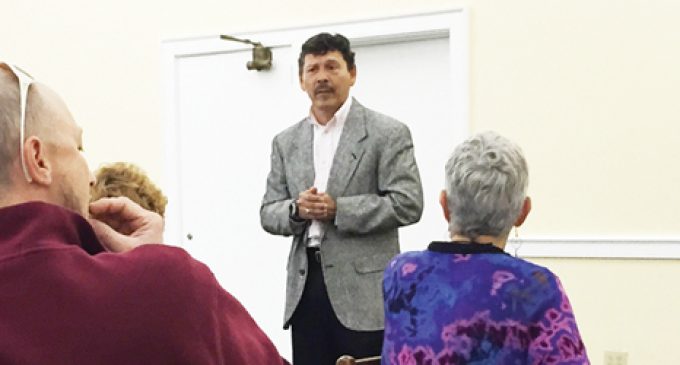Immigration, The Christian Way

N.C. Council of Churches pushing for reform
(pictured above: Mauricio Castro speaks.)
The tumultuous immigration debate has led some to ponder “What Would Jesus Do?”
Rev. David Guthrie says the answer is no mystery. From His humble gesture of washing guests’ feet at The Last Supper to the graciousness He shows when invited into the home of Mary, Martha and Lazarus, Guthrie says the Bible is replete with examples of Jesus showing and receiving hospitality.
“We see Jesus as guest, and we also see Jesus as host,” Guthrie, president of the Elders’ Conference of the Southern Province of the Moravian Church, told about two dozen church leaders and other people of faith.
“From Hostility to Hospitality: Immigration and People of Faith,” a series of discussions the North Carolina Council of Churches is hosting across the state, brought them to Home Moravian Church on Thursday, Nov. 13. The series provides a non-formal environment
where faith leaders can ask honest questions and engage in positive dialogue, according to Jennie Wilburn, a program associate with the N.C. Council of Churches, a nearly 80-year-old organization that advocates for Christians to work toward a more just society.
At the local gathering, the mostly Moravian attendees shared lunch and banter before the formal discussion began. For many on hand, immigration is an issue that has already hit close to home. Pastors said lack of citizenship has stymied some members of their flocks at every turn. The roughly 100 members of Rev. Willie Israel’s congregation at Rolling Hills Moravian in Longwood, Fla. hail from 17 different countries. The ones without citizenship, she said, often work for a pittance in deplorable conditions and lack access to social, educational and legal resources.
“For me, it’s a personal issue because this is about people I work with on a daily basis,” said Israel, who perviously served at churches in North Carolina.
Mauricio Castro, community organizer for the North Carolina Latino Coalition, was invited to give a statewide snapshot of immigration. Officially, the state’s Hispanic population is about 750,000 – way up from 22,000 in 1960 – but Castro estimates the population is much closer to 840,000. Fear of “La Migra” (a term for U.S. immigration enforcers) keeps many from cooperating with census-takers, he said.
Arguments that undocumented residents take jobs away from citizens and use public resources without contributing are fallacies, Castro claims. His research – funded through Winston-Salem-based Z. Smith Reynolds Foundation – found that Hispanics pumped $9.5 billion into the state’s economy in 2010.
“Do you think North Carolina can afford to lose $9.5 billion?” he asked.
He countered the job-stealing argument with hard figures he claims show that the often low-paying jobs Hispanics are forced to take because of language and citizenship barriers have created so-called spin-off industries that have spawned close to 100,000 jobs and sustained Tar Heel State mainstays like agriculture and textiles.
“Some people have gotten very good at playing fear factor,” Castro said of those who vehemently argue against immigration.
Castro touched upon the controversial comprehensive immigration reform bill that stalled in the U.S. House of Representatives in 2013 after passing through the Senate. That issue is very much in the national spotlight this week as President Obama is reportedly set to bypass Congress by signing an executive order that could protect up to five million people from deportation. Such an action would still be far less sweeping than the bill the Senate passed. It would have cleared a path to citizenship for 11.5 million people who are in the United States illegally.
Wilburn said some sort of action is needed immediately. The N.C. Council of Churches has been alarmed by resolutions passed in Surry and other N.C. counties that it says discourage undocumented children from attending school.
“These counties are making it clear that unaccompanied minors are not welcome here and will receive no support,” Wilburn said in a statement. “As North Carolinians and people of faith, we need to make it clear that we are the people who do not neglect the stranger, and we are the people who do not turn away children from our communities. While we may disagree about some of the policy particulars moving forward, we are united in the belief that every person is a child of God and that we are called to offer hospitality to our neighbors.”
Learn more at www.ncchurches.org and www.latinocoalitionnc.org.


















